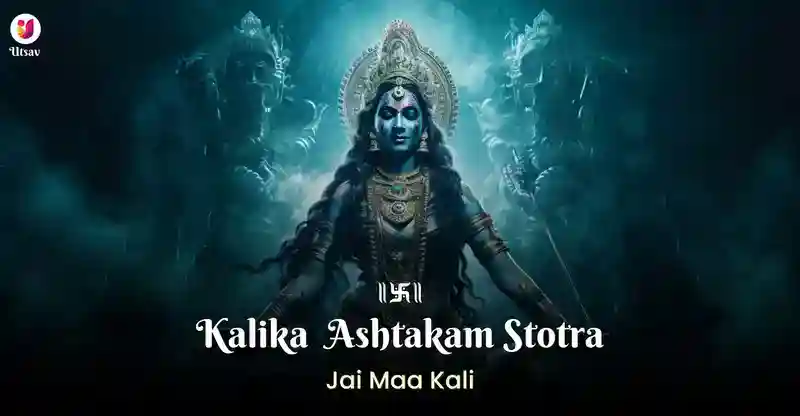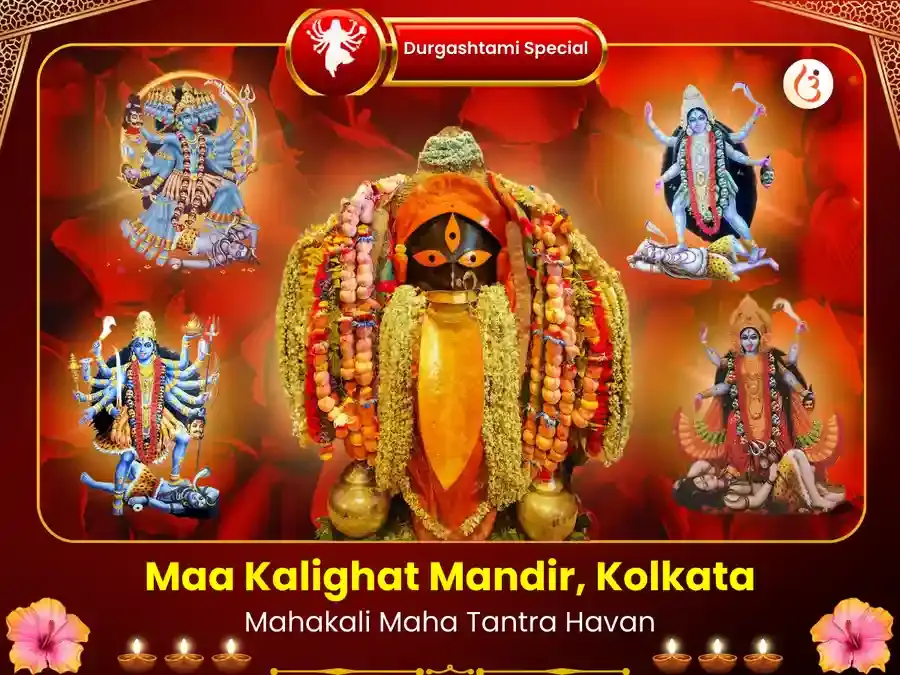Kalika Ashtakam - Complete meaning and benefits of chanting
Wed - Apr 10, 2024
6 min read
Share
The Kalika Ashtakam is a devotional hymn dedicated to Goddess Kali, composed of eight verses. It praises Goddess Kali's fierce and compassionate nature, invoking her blessings for protection, courage, and liberation from worldly bondage. The hymn highlights her power to destroy ignorance and negativity while bestowing devotees with strength, wisdom, and divine grace. It is recited by devotees seeking the removal of obstacles, spiritual transformation, and the attainment of ultimate liberation.

Stotra
Galadaraktamuṇḍāvalīkaṇṭhamālā
Mahāghorarāvā sudanṣhṭrā karālā।
Vivastrā shmashānālayā muktakeshī
Mahākālakāmākulā kālikeyam।।1।।
Bhuje vāmayugme shiroSsian dadhānā
Varan dakṣhayugmeSbhayan vai tathaiva।
SumadhyāSpi tuangastanābhāranamrā
Lasadaraktasṛukkadvayā susmitāsyā।।2।।
Shavadvandvakarṇāvatansā sukeshī
Lasatpretapāṇian prayuktaikakānychī।
Shavākāramanychādhirūḍha़ā shivābhi-
ShchaturdikṣhushabdāyamānāSbhireje।।3।।
Stuti:
Viranychyādidevāstrayaste guṇāanstrīn
Samārādhya kālīan pradhānā babhūvu:।
Anādian surādian makhādian bhavādian
Svarūpan tvadīyan n vindanti devā:।।4।।
Jaganmohanīyan tu vāgvādinīyan
Suhṛutpoṣhiṇīshatrusanhāraṇīyam।
Vachastambhanīyan kimuchchāṭanīyan
Svarūpan tvadīyan n vindanti devā:।।5।।
Iyan svargadātrī puna: kalpavallī
Manojāanstu kāmān yathārthan prakuryāt।
Tathā te kṛutārthā bhavantīti nityan
Svarūpan tvadīyan n vindanti devā:।।6।।
Surāpānamattā subhaktānuraktā
Lasatpūtachitte sadāvirbhavatte।
Japadhyānapūjāsudhādhautapankā
Svarūpan tvadīyan n vindanti devā:।।7।।
Chidānandakandan hasan mandamandan
Sharachchandrakoṭiprabhāpunyjabimbam ।
Munīnāan kavīnāan hṛudi dyotayantan
Svarūpan tvadīyan n vindanti devā:।।8।।
Mahāmeghakālī suraktāpi shubhrā
Kadāchid vichitrākṛutiryogamāyā।
N bālā n vṛuddhā n kāmāturāpi
Svarūpan tvadīyan n vindanti devā:।।9।।
Kṣhamaswāparādhan mahāguptabhāvan
Mayā lokamadhye prakāshīkṛutan yat ।
Tav dhyānapūten chāpalyabhāvāt
Svarūpan tvadīyan n vindanti devā:।।10।।
Falashruti:
Yadi dhyānayuktan paṭhed yo manuṣhya-
Stadā sarvaloke vishālo bhavechcha।
Gṛuhe chāṣhṭasiddhirmṛute chāpi mukti:
Svarūpan tvadīyan n vindanti devā:।।11।।
।।iti shrīmachchhankarāchāryavirachitan shrīkālikāṣhṭakan sampūrṇam।।
Stotra with meaning
Galadaraktamuṇḍāvalīkaṇṭhamālā
Mahāghorarāvā sudanṣhṭrā karālā।
Vivastrā shmashānālayā muktakeshī
Mahākālakāmākulā kālikeyam।।1।।
Meaning - This Goddess Kali has a garland of heads dripping blood from her neck, she is making very horrible sounds, she has beards and her appearance is terrifying, she is without clothes, she lives in the cremation grounds, her hair is dishevelled and she is engaged in lovemaking with Mahakaal.
Bhuje vāmayugme shiroSsian dadhānā
Varan dakṣhayugmeSbhayan vai tathaiva।
SumadhyāSpi tuangastanābhāranamrā
Lasadaraktasṛukkadvayā susmitāsyā।।2।।
Meaning - She holds a human head and a sword in her left hands and a Vara and Abhaya mudra in her right hands. She has a beautiful waist, she is bent due to the weight of her raised breasts, the upper part of her lips is decorated with blood and her face has a sweet smile.
Shavadvandvakarṇāvatansā sukeshī
Lasatpretapāṇian prayuktaikakānychī।
Shavākāramanychādhirūḍha़ā shivābhi-
ShchaturdikṣhushabdāyamānāSbhireje।।3।।
Meaning - She has two ornaments in the form of corpses in both her ears, she has beautiful hair, she is wearing a decorated belt made from the hands of corpses, she is seated on a platform in the form of a corpse and is adorned by female jackals making terrifying sounds on all four sides.
Viranychyādidevāstrayaste guṇāanstrīn
Samārādhya kālīan pradhānā babhūvu:।
Anādian surādian makhādian bhavādian
Svarūpan tvadīyan n vindanti devā:।।4।।
Meaning – Brahma and the other three gods have become supreme by taking shelter of your three qualities and you have become supreme by worshipping Bhagwati Kali. Your form is without beginning, foremost among the gods, is the main form of sacrifice and is the foundation of the world; even the gods do not know this form of yours.
Jaganmohanīyan tu vāgvādinīyan
Suhṛutpoṣhiṇīshatrusanhāraṇīyam।
Vachastambhanīyan kimuchchāṭanīyan
Svarūpan tvadīyan n vindanti devā:।।5।।
Meaning – This form of yours enchants the entire universe, is worthy of being praised in words, is the protector of friends, destroyer of enemies, pacifies speech and is the destroyer of all evil; even the gods do not know this form of yours.
Iyan svargadātrī puna: kalpavallī
Manojāanstu kāmān yathārthan prakuryāt।
Tathā te kṛutārthā bhavantīti nityan
Svarūpan tvadīyan n vindanti devā:।।6।।
Meaning – She is the giver of heaven and is like Kalpa. She fulfills the desires of her devotees in reality and they are fulfilled forever; even the gods do not know this form of hers.
Surāpānamattā subhaktānuraktā
Lasatpūtachitte sadāvirbhavatte।
Japadhyānapūjāsudhādhautapankā
Svarūpan tvadīyan n vindanti devā:।।7।।
Meaning – You remain inebriated by drinking liquor and always have affection for your devotees. You always appear in the beautiful and pure hearts of devotees. You wash away the mud of ignorance of devotees with the nectar of chanting, meditation and worship; even the gods do not know this form of yours.
Chidānandakandan hasan mandamandan
Sharachchandrakoṭiprabhāpunyjabimbam
Munīnāan kavīnāan hṛudi dyotayantan
Svarūpan tvadīyan n vindanti devā:।।8।।
Meaning – Your form is full of bliss, is softly smiling, is like the reflection of the radiance of millions of moons in the autumn and illuminates the hearts of sages and poets; even the gods are not aware of this form of yours.
Mahāmeghakālī suraktāpi shubhrā
Kadāchid vichitrākṛutiryogamāyā।
N bālā n vṛuddhā n kāmāturāpi
Svarūpan tvadīyan n vindanti devā:।।9।।
Meaning – You are dark in colour like the clouds of destruction, sometimes you are red in colour and sometimes you are bright in colour. You have a strange appearance and are the form of Yogmaya. You are neither a child, nor an old woman, nor a lustful young woman; even the gods do not know this form of yours.
Kṣhamaswāparādhan mahāguptabhāvan
Mayā lokamadhye prakāshīkṛutan yat ।
Tav dhyānapūten chāpalyabhāvāt
Svarūpan tvadīyan n vindanti devā:।।10।।
Meaning – Being purified by your meditation, I have in my fickleness revealed this most secret feeling to the world, please forgive me for this crime of mine; even the gods do not know this form of yours.
Yadi dhyānayuktan paṭhed yo manuṣhya-
Stadā sarvaloke vishālo bhavechcha।
Gṛuhe chāṣhṭasiddhirmṛute chāpi mukti:
Svarūpan tvadīyan n vindanti devā:।।11।।
Meaning – If a person recites this with concentration, he becomes great in all the worlds. He gets all the eight siddhis in his house and also attains salvation after death; even the gods do not know this form of yours.
।।iti shrīmachchhankarāchāryavirachitan shrīkālikāṣhṭakan sampūrṇam।।
Benefits of chanting Kalika Ashtakam Stotra
Removal of Obstacles: Goddess Kali helps in overcoming obstacles and challenges in life.
Protection from Negativity: She provides protection from negative energies and evil forces.
Courage and Strength: Worshipping Kali instills courage and inner strength to face difficulties.
Spiritual Transformation: The hymn facilitates spiritual growth and transformation.
Destruction of Ignorance: Kali destroys ignorance and helps in attaining knowledge and wisdom.
Divine Grace: Invoking Kali's blessings brings divine grace and favor.
Freedom from Bondage: She liberates devotees from worldly bondage and attachments.
Granting Desires: Kali fulfills the sincere desires of her devotees.
Who can chant Kalika Ashtakam & When to chant?
The "Kali Ashtakam" can be chanted by anyone who has faith and devotion towards Goddess Kali. There are no specific restrictions based on age, gender, or caste.
As for when to chant, there are various times considered auspicious for chanting the Kali Ashtakam:
1. Evening: Chanting the Kali Ashtakam in the evening, especially during the twilight hours or after sunset, is considered auspicious. It can help invoke the divine energy of Goddess Kali for protection and blessings.
2. During Navratri: The nine-day festival of Navratri, especially the last three days dedicated to Goddess Kali, is an auspicious time to chant the Kali Ashtakam. Devotees often recite this hymn as part of their worship during Navratri celebrations.
3. New Moon (Amavasya): The new moon day, or Amavasya, is considered highly sacred for worshiping Goddess Kali. Chanting the Kali Ashtakam on this day is believed to be particularly beneficial for seeking her blessings and protection.
4.As Needed: Additionally, you can chant the Kali Ashtakam whenever you feel the need for Goddess Kali's guidance, protection, or blessings. It can be chanted during times of distress, facing challenges, or seeking spiritual upliftment.
Ultimately, the timing of chanting the Kali Ashtakam depends on individual preference and circumstances. The most important aspect is to chant it with sincerity, devotion, and reverence towards Goddess Kali.
How to chant the Ashtakam?
Before chanting the Devi Kali ashtakam, here are some traditional practices that devotees may follow to prepare for a more focused and meaningful experience:
Inner Cleanliness: Take a bath or wash your hands and face to feel physically clean. This can symbolize inner purification as well.
Peaceful Environment: Find a quiet, clean space free from distractions where you can focus on the chanting.
Simple Attire: Wear comfortable and clean clothes that allow you to sit comfortably.
Devotional Mindset: Approach the chanting with reverence and devotion to Devi Kali. Set an intention for your chanting, whether it's seeking protection, peace, or spiritual growth.
Prayer (Optional): You can offer a short prayer to Devi Kali before chanting, expressing your gratitude and seeking his blessings.
